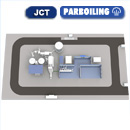The landscape of parboiled rice milling is rapidly transforming, driven by groundbreaking technological innovations that enhance efficiency, output quality, and sustainability. Modern mills are now equipped with cutting-edge machinery that automates various processes, such as soaking, steaming, and drying the rice. This automation streamlines operations, minimizing labor costs and reducing human error. Furthermore, advanced sensors and control systems allow for precise monitoring of the milling process, ensuring consistent quality and taste that meet consumer demands. The integration of energy-efficient technologies not only boosts productivity but also promotes environmentally friendly practices within the industry.
As the modern parboiled rice mill industry evolves, integrating sustainability into the design and operation of rice mills has become imperative. This commitment to green practices not only enhances operational efficiency but also contributes to environmental conservation. Key sustainability practices include:
- Energy Efficiency: Modern mills are equipped with energy-efficient machinery and smart technology to minimize energy consumption during processing.
- Water Management: Techniques such as recirculation systems and rainwater harvesting reduce water usage significantly.
- Waste Minimization: Byproducts from rice milling are repurposed as feed, biofuel, or organic fertilizer, effectively closing the loop on waste.
Furthermore, collaborative initiatives among mill operators, local farmers, and environmental organizations emphasize the importance of sustainable practices. Many mills are now designed to incorporate sustainable sourcing and supply chain practices, ensuring that:
- Local Sourcing: Prioritizing locally grown rice promotes community economics and reduces transportation emissions.
- Certification Programs: Engaging in fair trade and organic certification enhances transparency and market access for sustainable products.
- Employee Training: Regular training for staff on sustainable practices ensures that all operations align with environmental goals.
The advent of modern parboiled rice milling technology is not just transforming the agricultural landscape, but also revitalizing local economies that rely heavily on agriculture. Innovative milling solutions empower farmers by enabling them to enhance the quality and quantity of their rice production while maximizing profit margins. This shift toward advanced processing methods includes:
Moreover, the integration of these solutions attracts investment in the agricultural sector, further driving economic growth. For example, locally-owned mills can significantly contribute to community development by reinvesting profits into educational and health initiatives. The following table highlights the key benefits of adopting innovative milling solutions:

